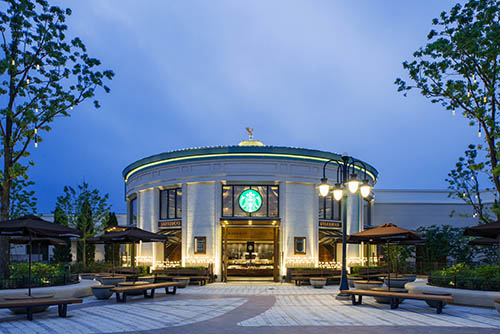Seattle — As of the end of 2024, Starbucks had verified more than 9,000 stores for meeting robust standards, as verified by an outside auditor, across eight environmental impact areas such as energy efficiency, water stewardship and waste diversion. These measures — taking steps toward a more sustainable build, design and operations — are planned to be implemented across 10,000 stores in 2025.
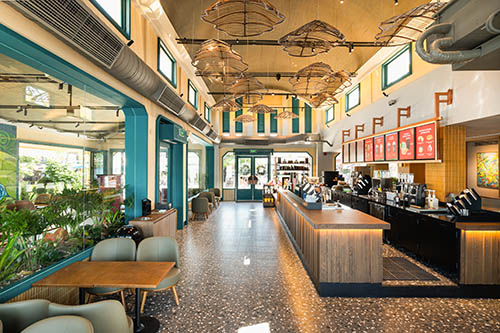
Of the 9,000 stores, Starbucks is celebrating five stores for excelling in innovation, environmental impact, community connection, inspiration, and customer and partner experience. These stores reflect Starbucks ongoing commitment to cut its carbon emissions, water use and landfill waste — while innovating at scale. Store features include:
• Energy Management Systems (EMS) that monitor and reduce consumption
• Recyclable and low-emission building materials
• Native landscaping that supports local biodiversity and reduces water use
• EV charging infrastructure, now available at or nearby over 1,000 locations
The five stores are:
1. General Booth & Nimmo, Va., USA
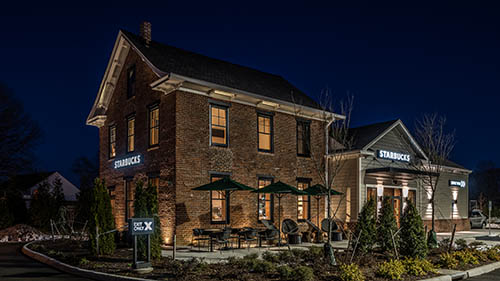
Recognized by the Virginia Beach Historic Preservation Partnership, this classical Virginia-style home, built circa 1832, was relocated to the Hickman Shopping Center and transformed into a Starbucks Drive-Thru. It exemplifies adaptive reuse, operates on 100% renewable electricity, uses water-saving native plants, and incorporates renewable materials in its design.
2. Ahau Tulum, Mexico
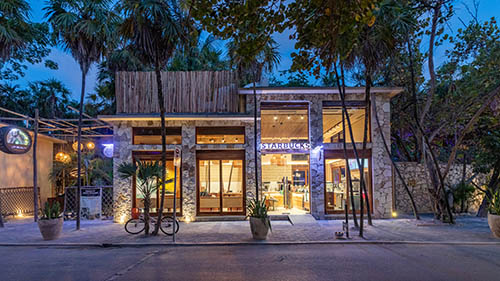
Located in the heart of Tulum, Starbucks Ahau merges Quintana Roo’s natural beauty with Mayan culture. Reflecting a bohemian essence and connection with nature, the store celebrates local craftsmanship and spirit. Inspired by coffee farms, it uses responsible materials like bamboo and features endemic plants to promote conservation and ecosystem balance.
3. Kampot ‘Fish Market,’ Cambodia
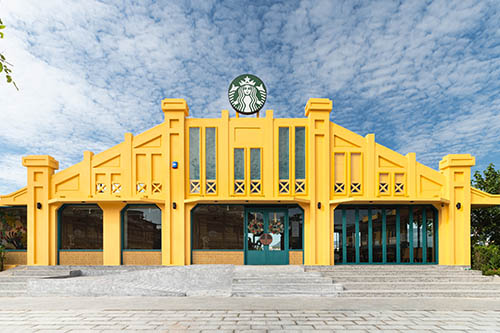
Located in the historic Kampot “Fish Market” building from the 1930s French colonial era, the store preserves original architectural features with a vintage color theme and fixtures. Its interior blends modern and traditional styles, featuring local plants and a captivating mural, creating a warm, inviting atmosphere. The store also includes water-efficient fixtures that benefit the local community.
4. Kyoto Kuze Store, Japan
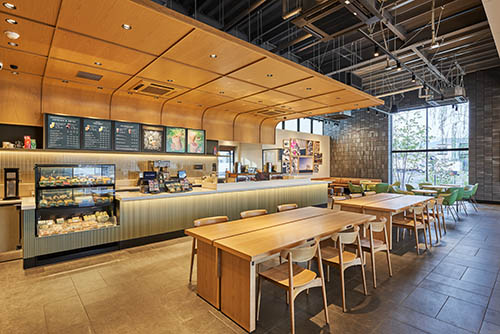
Located on a major road leading to city center, this store is busy with commuters during the week and families on the weekend. The store features solar panels, EV charging stations and nurtures the culture of reusable cup adoption and usage.
5. Shanghai Disney Resort, China
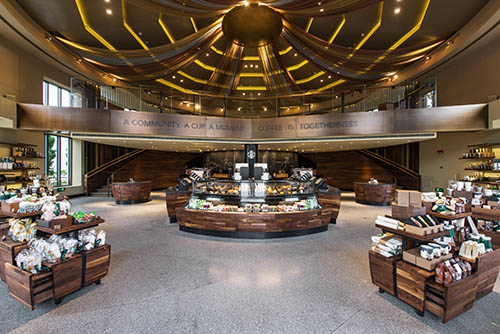
The Disney Resort store is recognized for its variety of sustainability efforts including energy storing, modern HVAC/EMS systems, LED lighting and waste management practices. The design also promotes an open-air feeling that is inviting for sit and stay including its outdoor space.
These verified stores successfully meet robust standards developed in partnership with the World Wildlife Fund. This portfolio of stores saves Starbucks over $60 million in operating costs annually, including 30% water savings and 30% energy reduction.
EV charging is one of Starbucks key strategies supporting its environmental promise to give more than it takes, creating more options for customers looking to sip and charge. Starbucks now has 34 direct current (DC) fast charging stations at stores, 17 of which were installed in 2024, so Starbucks customers can enjoy their favorite beverage while charging on-site. Starbucks plans to expand to 100 more stores in partnership with Mercedes-Benz High Powered Charging, aiming to electrify core urban areas and charging deserts. Customers can also find EV chargers nearby at more than 1,000 of our coffeehouses.
By investing in renewable electricity projects, Starbucks is actively working to reduce its carbon footprint and promote new clean energy generation. Starbucks aims to leverage its scale in electricity usage to help accelerate the transition to clean energy. Since 2015, Starbucks has powered all its North American company-operated stores with renewable electricity and directly invested more than $225 million in solar and battery storage projects across the U.S.
SOURCE: Starbucks

